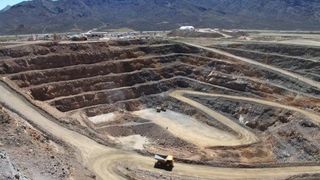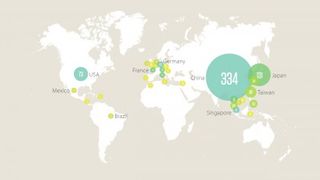Our smartphone addiction is costing the Earth
The phone ads aren't telling you everything
Once you start investigating the metals and minerals that go into your smartphone, there's more to consider than just how much of this stuff is left underground. The way it's extracted, the impact of the mining, the wage of the workers and the way the mining profits are used all have an influence on production and thus the cost and environmental footprint of your smartphone.

For example, copper is mined in Chile, the United States, Peru, Australia, Russia, Indonesia, Canada, Zambia, Poland, Kazakhstan, Mexico and China – in fact a lot of smartphone materials are sourced in China, via companies that have traditionally been reticent to reveal too much about their methods.
That means many different people, organisations and governments are involved in just the first step of the supply chain.
On top of that you can add manufacturers, logistics firms, high street retailers and many other agencies. The pressures on all these companies affect the final product you get in your hand – how much it costs, which materials were chosen, and the environmental impact production.
In Friends of the Earth's 2013 Make It Better campaign, the charity looked at some of the environmental and social impacts of tin mining across the world. In Bangka, Indonesia, excessive tin mining was found to have dramatically changed the natural landscape, leaving acidic craters in place of lush forests and making clean drinking water harder to come by.
"In general refurbishing and recycling phones is a good 'mining prevention strategy'," Evert Hassink from Friends of the Earth tells us. "The problem is that most [smartphone metals] can be found but at higher financial, ecological and social cost."
"We ask for supply chain transparency to motivate brands to feel responsible for the materials and components they purchase," he says. "We would like to see electronics that can be repaired and upgraded... And as mining is here to stay, it is also important for governments and companies to impose strict regulations, even if this makes metals and minerals more expensive."
Get daily insight, inspiration and deals in your inbox
Sign up for breaking news, reviews, opinion, top tech deals, and more.
Phone makers are increasingly being asked to take accountability for their supply chain, and that usually means a rise in prices – ensuring a fair wage for workers, reducing environmental impact, and expanding accountability programmes all cost money.

Firms such as Molycorp have worked to mine rare Earth metals in as green a way as possible, "maintaining workplaces that are safe, efficient and managed with environmental sustainability in mind," in the company's own words - but, in a sign of how difficult the whole process is, the firm's mine in California hasn't proved to be economically viable.
Trying to put together a responsible mining process means looking at everything from dealing with waste products to following the profits trail.
This can lead to some troubling and violent places, in the case of conflict minerals – that is, minerals mined in conditions of armed conflict and human rights abuses, and sold or traded by armed groups.
This is an issue particularly associated with the Democratic Republic of Congo, where the various parties in the longstanding civil war have commandeered resources to fund their violent activities.
Increased consumer and government interest means the big names are now taking these issues very seriously indeed, as we reported last year. Laws are being passed, organisations are being established, and steps are being taken to make sure rare Earth metals and other smartphone materials are sourced with environmental and ethical responsibility in mind.
Changing approaches
There are several approaches to easing some of the strain that smartphone production puts on the Earth: making sure each phone lasts longer is a key one, as is improving the efficiency of recycling processes so we can get more of the raw materials back.

Initiatives such as the Project Ara modular smartphone aren't just quirky experiments. They could make a real difference to the life cycle of each phone, because outdated components can be swapped out and recycled rather than thrown away.
Apple is the brand shouting the loudest about its environmental credentials. Its suppliers aren't all certified as conflict-free, but the company is working on it: currently nine out of every 10 smelters in Apple's supply chain have been verified as conflict-free or are undergoing audits, and the number is growing. In 99% of the countries where Apple sells goods, there's an official recycling programme too.
Other companies have made similar commitments, though the situation is still far from perfect, and a commitment doesn't always equate to a reality. HTC, Samsung, LG, Sony and Motorola all have environmental policies, which they have published online.
Working with non-profits like the EICC (Electronic Industry Citizenship Coalition), all have signed up to meet certain standards in worker rights, environmental impact and transparency.
These moves are certainly an added cost for manufacturers, and may delay the process of getting a smartphone from the drawing board to your pocket, but keep them within internationally-agreed limits on how phones are produced: the EICC guidelines cover everything from greenhouse gas emissions to the use of bribes.
The majority of these guidelines are voluntary, though some legislation is involved - the Dodd-Frank Act in the US requires that firms "make efforts" to determine the source of their gold, tin, tungsten and tantalum.

One of the loudest voices on the topic is also one of the smallest companies: Fairphone began life as an awareness campaign in 2010, but eventually realised the best way to make a difference would be to build its own devices. The Fairphone 2 comes out later this year.
Fairphone doesn't want to sell a bucketload of handsets, but it does want to change the way the big companies think about smartphone manufacture in four key areas: mining, design, manufacturing and life cycle.
"We're really trying to influence and inform customers... and trying to look at changing behaviour," says Fairphone's Tessa Wernink. "I think the last couple of decades have been instrumental in shaping our world from a technology point of view, but then we've come to a point where we're able to see some of the mess that has been created along the way."

Even for an organisation as committed to change as Fairphone, tracing materials through the supply chain isn't easy, and involves approaching it from both ends of the process: the mining of raw materials and the finished smartphone.
"We're currently in the process of mapping the whole supply chain for the four conflict materials – tin, tantalum, tungsten, and gold," Fairphone's Bibi Bleekemolen tells us.
"Going further, of course there's copper, there's cobalt, there's aluminium, there's silver. You name it. There's so many things used in these very small components. By combining top-down and bottom-up approaches, we try to map our own supply chain and improve it."
A more transparent system won't necessarily alter the construction of your phone, but it would mean that every component is accounted for – from where it was mined to its impact on the environment. That data would help governments, charities and phone manufacturers to ensure that our gadget addiction becomes a sustainable and stable enterprise.
Right now, there's no choice when it comes to what goes into your smartphone: handsets all rely on the same set of minerals and rare Earth metals, and all of these are becoming more scarce.
But what you can do is ask questions about where these metals come from and think about what's going to happen to your handset once it's time for an upgrade – there are plenty of organisations who will recycle your old mobile for you and make sure that we get as much copper, gold, tin and other elements back.
It's time to think not only about what our smartphones can do for us, but also about what we're doing to the world with our smartphones.
- Now read: How to recycle your old PC

Dave is a freelance tech journalist who has been writing about gadgets, apps and the web for more than two decades. Based out of Stockport, England, on TechRadar you'll find him covering news, features and reviews, particularly for phones, tablets and wearables. Working to ensure our breaking news coverage is the best in the business over weekends, David also has bylines at Gizmodo, T3, PopSci and a few other places besides, as well as being many years editing the likes of PC Explorer and The Hardware Handbook.